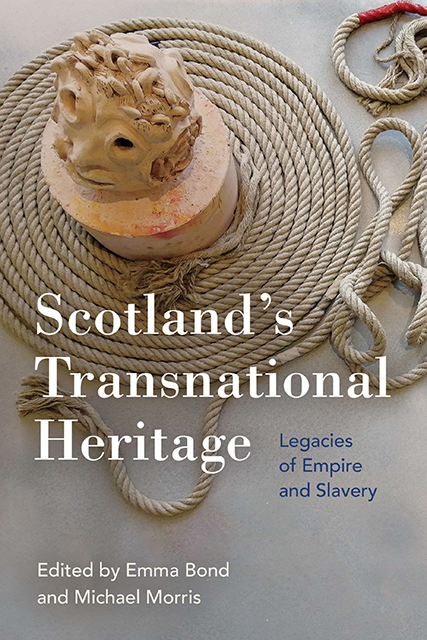Book contents
- Frontmatter
- Contents
- List of Figures
- Notes on Contributors
- Acknowledgements
- Foreword: Fostering Recognition under the Luxury of Amnesia
- Chapter 1 An Introduction to Scotland’s Transnational Heritage: Sites, Things and Time(s)
- Part I Transnational Sites
- Part II Transnational Things
- Part III Transnational Time(s)
- Afterword: Building Solidarity: Moving Towards the Repatriation of the House of Ni’isjoohl Totem Pole
- Index
Chapter 6 - The East India Company and Scotland: Tracing the Recovery and Reappraisal of a Transnational Corporation
Published online by Cambridge University Press: 25 October 2023
- Frontmatter
- Contents
- List of Figures
- Notes on Contributors
- Acknowledgements
- Foreword: Fostering Recognition under the Luxury of Amnesia
- Chapter 1 An Introduction to Scotland’s Transnational Heritage: Sites, Things and Time(s)
- Part I Transnational Sites
- Part II Transnational Things
- Part III Transnational Time(s)
- Afterword: Building Solidarity: Moving Towards the Repatriation of the House of Ni’isjoohl Totem Pole
- Index
Summary
Introduction: decolonisation and reassessment
Following the Act of Union in 1707, many Scots made their careers abroad in the East India Company. The British crown enabled the company to have an army, wage wars and collect taxes, and Britain benefitted substantially from the company’s annexation of regions across the Indian subcontinent. The growing British Empire provided opportunities for Scots to establish shipping companies, tea plantations and jute mills, as well as to manufacture products aimed at markets in the colonies. Scotland’s gains came at great cost to colonised people across South Asia, with cheap Scottish industrial products undercutting local craftspeople.
This study stems from my small but enlightening role within a decolonisation project at V&A Dundee, for which I helped to re-write some of the object labels in the Scottish Design Galleries. On its website, V&A Dundee shares a quotation from Anoushka Khandwala, which explains that decolonisation is ‘an acknowledgement that in the West, society has been built upon the colonisation of other nations, that we exist within a system of privilege and oppression, and that a lot of the culture we’ve come to see as ours has actually been appropriated or stolen’. The Transnational Scotland team worked with V&A Dundee as one of its project partners, bringing together a cross section of representatives from academic and arts institutions, to address the gaps and silences in the Western narratives in museums and galleries. To this end, V&A Dundee reopened in August 2020 after the COVID lockdown with some rewritten labels which showcased new narratives in order to acknowledge that ‘there is the other side, always’. Transnational trade engendered the links between Scottish products and Indian raw materials, and museums like V&A Dundee have now begun to document the complex and even murky history of its acquisitions and collections, addressing some of the silences behind the journeys their artefacts have made and the influence they have had on Scottish designs.
- Type
- Chapter
- Information
- Scotland's Transnational HeritageLegacies of Empire and Slavery, pp. 89 - 103Publisher: Edinburgh University PressPrint publication year: 2023



